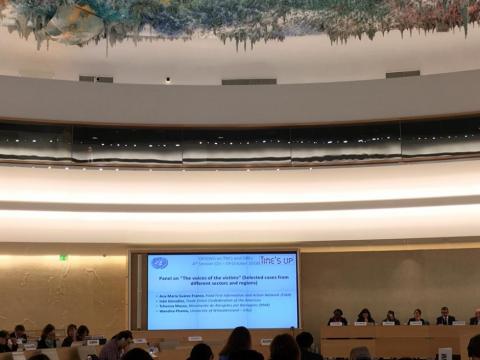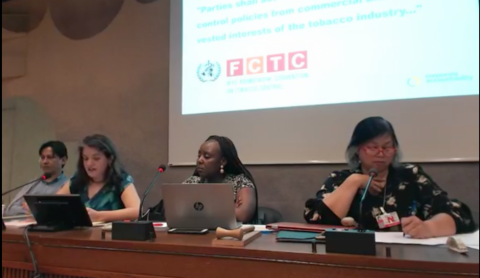
Advocating for binding treaty on business and human rights
More than 25 ESCR-Net member organizations gathered at the United Nations (UN) Human Rights Council this past October 15-19 to support and advocate for a strong treaty on human rights and transnational corporations and other business entities (TNCs-OBEs) at the 4th session of the Open-Ended Inter-Governmental Working Group (IGWG). In addition to conducting direct advocacy with state delegations, members made numerous oral interventions on the Council floor concerning the zero draft (English, unofficial Spanish); organized and participated in 12 side events and carried out several communications and mobilization strategies within and beyond the UN halls.
At the week’s conclusion, the treaty process emerged with apparent momentum toward a first draft and a 5th session of the IGWG in 2019. The treaty’s overall project and approach were championed by several of the record-number of 93 state delegations present and benefited from strong support of hundreds of members of affected communities, social movements, and civil society organizations present at the proceedings. Nevertheless, opposition from some states and business-affiliated lobbyists, as well as lessening support from previously strong ally states (as described in greater detail below), presented challenges to be considered and addressed going forward.
Members present at the 4th IGWG included: ActionAid International, Adalah – The Legal Center for Arab Minority Rights in Israel, Al-Haq, ALTSEAN-Burma, Amnesty International, Asia Pacific Forum on Women, Law and Development (APWLD), Association for Women's Rights in Development (AWID), Center for Constitutional Rights (CCR), Center for International Environmental Law (CIEL), Centre for Applied Legal Studies (CALS), Centro de Derechos Económicos y Sociales (CDES), Comité Ambiental en Defensa de la Vida, Coordinadora Andina de Organizaciones Indígenas (CAOI), Corporate Accountability, FIAN, Franciscans International (FI), Initiative for Social and Economic Rights (ISER), International Commission of Jurists, International Federation for Human Rights (FIDH), Justiça Global, Kenya Human Rights Commission (KHRC), Movimento dos Atingidos por Barragens (MAB), Movimiento Unificado Francisco Sánchez-1932 (MUFRAS-32), Posco Pratirodh Sangram Samiti (PPSS), Project on Organizing, Development, Education, and Research (PODER), Tebtebba Foundation (Indigenous Peoples’ Centre for Policy Research and Education) and, Zimbabwe Environmental Law Association (ZELA).
Members made dozens of oral interventions during the IGWG sessions. Oral statements during the session, by States, Observers, International Organizations, NHRIs and NGOs, can be found here under the heading ‘Oral Statements.’ FIAN has shared their mapping of general state positions and presence in connection with the 4th IGWG: available here.
Several members participated in a variety of actions in the days leading up to and including the IGWG week. Among those were the Global Campaign to Dismantle Corporate Power’s marches, sit-ins, press conferences and events during their Week of Peoples Mobilization; a protest against the threat of a Bolsonaro presidency in Brazil; and a standing show of solidarity in response to business-lobby apparent efforts to economically intimidate state allies of the treaty process.
Preparing for the 4th IGWG
Network members have been preparing for the 4th IGWG since the prior session. The steps highlighted below focus on preparatory steps involving members in the immediate lead up to latest round of formal negotiations.
A core group of CAWG members developed advocacy position papers (English, Spanish, French and Arabic forthcoming) on the Zero Draft of the Treaty for the consideration of the IGWG in relation to:
1. Adopting stronger safeguards against corporate capture (undue corporate influence)
2. Integrating protections for human rights defenders
3. Addressing (more fully) the rights of indigenous peoples
4. Incorporating a feminist and gender responsive lens
5. Including stronger protections against corporate human rights abuse in conflict-affected areas
These were intended to facilitate the coordinated advocacy of ESCR-Net members at the IGWG and to support future advocacy at the international, regional and national level. These papers were intended primarily to support member advocacy, as well as serve as tools for allies. The advocacy position papers built on prior CAWG collective positions (from 2017 and 2016). In addition to the key issues highlighted above, members also reiterated many other advocacy points, such as those related to the primacy of human rights norms and the centrality of affected and resisting communities.
In addition, members wrote a variety of articles in the lead up to the session, analyzing the zero draft treaty and its optional protocol. Those articles include:
- Raphaela Lopes, from Justiça Global, and Arnold Kwesiga, from ISER, wrote a blog on behalf of CAWG titled, “What the Zero Draft and Protocol Lack: Meaningful Access to Justice – a Global South Perspective,” for the Business and Human Rights Resource Centre;
- Daniel Cerqueira, from the Due Process of Law Foundation, and Gabriela Kletzel, from Centro de Estudios Legales y Sociales CELS wrote an article titled, “First impressions on the Draft Optional Protocol to the Legally Binding Instrument regulating the activities of transnational corporations and other business enterprises,” analyzing the Draft Optional Protocol to the Treaty;
- “The ‘Zero Draft’ Treaty: Is it Sufficient to Address Corporate Abuses in Conflict-Affected Areas?” Shawan Jabarin and Maha Abdallah, Al-Haq;
- “Human rights defenders and corporate accountability– Is there a place for them in a treaty on business & human rights?” Carlos Lopez, International Commission of Jurists;
- “Justice not ‘special attention’: Feminist Visions for the Binding Treaty” Felogene Anumo and Inna Michaeli, AWID (Member of Feminists for a Binding Treaty);
- “The publication of the ‘Zero Draft’ documents is positive news, but it calls for much further discussion,” Maddalena Neglia, FIDH; and
- “Why the Treaty Draft is a Serious Basis for Negotiations,” Ana María Suarez Franco and Daniel Fyfe, FIAN International.
IGWG follow-up steps
Based on the conclusions and recommendations of the official report on the 4th IGWG session, the Chair-Rapporteur is expected to proceed with informal consultations with various stakeholders in the coming months, as well receiving formal written inputs from states by February 2019. In the meantime—at the insistence of a bloc of Southern Cone countries, most notably Brazil—OHCHR will produce an English-only annex to the official report that compiles all formal state interventions made during the plenary, including specific textual reform proposals.
FURTHER READING:
Various human rights defenders contributed to informal note-taking during the session. Non-exhaustive, non-quotable notes from the session are available in chronological order here. Separate notes categorized by state delegations are available, with the same caveats, here. In addition, the European Coalition for Corporate Justice produced summaries of plenary days: 1, 2, 3, 4, and 5.
For full recordings of the official proceedings, please visit the UN webcast archive, arranged chronologically here: Opening; Arts. 1&8; Arts. 6, 7, & 13; Art. 9; Arts. 10, 11 & 12; Arts. 3 & 4; Art. 5; Arts. 1, 14, & 15; “Voices of the Victims” panel and presentation of the Optional Protocol; Closing.

